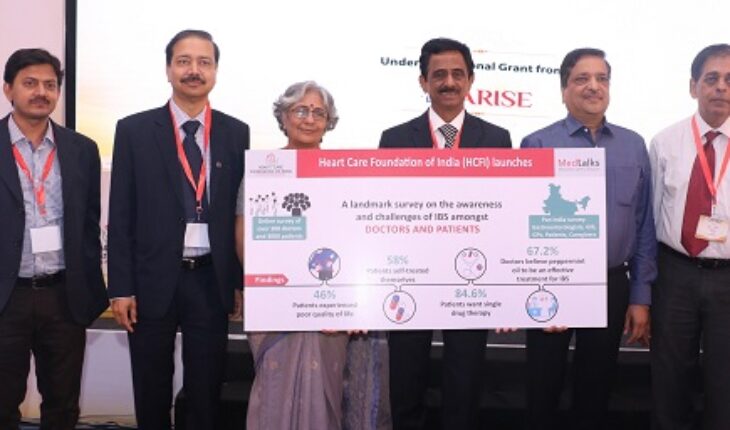Irritable Bowel Syndrome (IBS) is the second most common cause of work absenteeism in India, where around 5% to 10% of the population is suffering from this problem, and medical practitioners feel peppermint oil is the safest treatment to alleviate the symptoms, according to a survey conducted by national health NGO Heart Care Foundation of India (HCFI).
IBS manifests itself as abdominal pain, diarrhea, constipation or incomplete evacuation, but majority of such people do not seek medical help. While around 84.6% of the survey respondents felt that abdominal pain or other symptoms of IBS cannot be ignored, an overwhelming 58% of them used over-the-counter medications for relief without seeing a doctor, the survey noted in studying over 3000 patients and 300 medical practitioners.
Describing IBS as a chronic common condition of the digestive system that is second only to the common cold as a cause of absence from work, Dr. Philip Abraham, P D Hinduja Hospital, Mumbai, said, “This condition often begins in young adulthood with women twice as likely as men diagnosed with it. Most people with IBS have a mild form of the disorder and can cope quite well without getting any treatment. However, sometimes, the symptoms are so strong that it can significantly affect daily lives by causing distress. Various natural therapies are used in treating it including relief through antispasmodics and Peppermint oil has emerged as a safe treatment option for the condition.”
“Lifestyle preventions are most important in treating IBS which is identified through stress, lack of sleep etc. However, eating on time, not overeating, avoiding tobacco and moderation in alcohol consumption are some things to avoid IBS. Then comes medication,” he said.
The most common symptom of IBS is abdominal pain with changes in bowel habits (diarrhea and/or constipation), besides cramps in abdominal pain that varies in intensity. While some people notice that emotional stress and eating worsen the pain – where bowel movement relieves the pain — women may notice an association between pain episodes and their menstrual cycle.
Dr Chetan Bhatt, Sir H N Reliance Foundation Hospital, Mumbai, said “currently, there are many challenges that cloud the diagnosis and subsequent management of IBS, including lack of consistent biological markers, reliance on patient symptoms for diagnosis, difficulty in quantifying symptoms objectively, varying symptoms among individuals, and the fact that many organic conditions can masquerade as IBS. Lack of awareness about the condition among people and the medical fraternity at large further exacerbates the problem.”
The survey noted that while almost 55.9% of the doctors use a symptom-directed, multi-drug approach in the treatment of IBS, around 54.5% doctors prescribe antispasmodics and another 30.8% prescribe both antibiotics and antispasmodics.
About 80% of the doctors believed that an ideal antispasmodic for treatment of IBS should offer relief from symptoms of abdominal pain/discomfort, bloating/flatulence and complete evacuation, alongside minimum side effects. Peppermint oil has emerged as a good option, over half of the participating doctors said, adding that it is effective in relieving abdominal pain, gas, bloating and fecal urgency through its selective effect on the smooth muscles of the intestine.
Dr Uday C Ghoshal, said though OBS does not kill people, it affects a person’s productivity due to stress. Dr Shobna Bhatia opined that there are very few investigations in IBS which are abnormal, and that +Presenteeism+ is one such where people go to work but do not work.
Highlighting awareness about IBS, Dr KK Aggarwal,– President, HCFI said, “A simple mantra for IBS is if there is no pain, it can’t be IBS. Raising awareness about the disease incidence is the key. ”
The doctors noted that there is an unmet need in the treatment of IBS, as despite the wide variety and effective treatments available, most patients do not get appropriate treatment. More widespread knowledge and proper use of available therapies (such as diet restriction and peppermint oil) would enable the affected in achieving a better quality of life and relief from symptoms, they stated.
The survey threw some interesting insights. Around 84.6% respondents said that pain in abdomen and altered bowel habits cannot be ignored, while 58.3% people self-treat symptoms with over-the-counter drugs. Around 33.3% felt that the condition is not serious enough to contact a doctor, while 8.3% would seek no treatment at all, 46% felt that IBS hampers their daily life, 50% said they would take multiple drugs including antibiotics, antispasmodics etc., each time they have an attack, and 41.6% opted for diet change or probiotics in such attacks.






